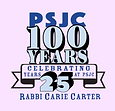Board of Trustees
Events @ PSJC
Welcome to the PSJC Events Page! Here you can find a listing of all of the classes, religious services, social and special events that are coming up at PSJC.
Events @ PSJC
Welcome to the PSJC Events Page! Here you can find a listing of all of the classes, religious services, social and special events that are coming up at PSJC.
.png)
Seder: Purchasing Food
A few tips to keep in mind when purchasing food for the seder:
Hierarchy of purchasing: While the CJLS formally permitted Ashkenazim (who choose) to consume kitniyot in 2015, due to the unprecedented disruptions in the food supply, the CJLS encourages everyone to consider putting aside the Ashkenazic custom of eschewing legumes (beans and lentils) corn and rice, if only for Passover 5780 (2020).
Below are the Conservative Movement’s guidelines for following “best practice” under trying circumstances:
It is important to note that many products that are plain, unflavored dairy products (like milk, yogurt, cottage cheese, and hard cheeses), frozen fruits and vegetables, packaged legumes, and rice can be purchased with a year-round hekhsher before Passover as a matter of course. This is not latitude granted during difficult circumstances, this is normative halakhah. It is only if they are purchased during Passover itself that many of these items need to carry a Kosher for Passover certification.
In general, we tend to be strict on our Passover lists due to the overall complexity of certifying individual items. This year we have simply relied on our current knowledge to lessen the burden we are all feeling, while still being within the normative constructs of Passover Kashrut.
This year, due to the limitations on product availability and in order to limit individuals having to check multiple stores, if you are unable to find an item below with a Kosher for Passover certification due to COVID-19 then here's what you can do.
Food requiring no Kosher for Passover certification no matter when purchased:
· Baking soda
· Pure bicarbonate of soda, without additives
· Eggs
· Fresh fruits and vegetables (including pre-washed bagged)
· Fresh or frozen kosher meat (other than chopped meat)
· Nestea (regular and decaffeinated)
· Pure black, green, or white tea leaves
· Unflavored tea bags
· Unflavored regular coffee
· Olive oils (and other pure oils)
· Whole or gutted fresh kosher fish
· Whole or half pecans (not pieces)
· Whole (unground) spices and nuts
· OU/Star-K Raisins
· Kosher wine
· Plain butter, either salted or unsalted
The following list of basic foods is ideally for pre-Passover purchasing food, but could extend, if determined necessary based on food supply shortages, and their likely production before Passover began, to purchase on Hol-HaMoed as well.
· all pure fruit juices
· Filleted fish
· Frozen fruit (no additives)
· Plain cheeses (without added flavor morsels)
· Non-iodized salt
· Pure white sugar (no additives)
· Quinoa (with nothing mixed in)* GF ideal
· White milk
· Some products sold by Equal Exchange Fair Trade Chocolate
· Frozen Vegetables (needs to be checked for possible hametz before cooking)
· Chopped meat
· Plain, non-flavored almond milk, rice milk, soy milk, cashew milk.
· Non-flavored Cream Cheese with ingredients of milk and cream, salt, stabilizers (xanthan and/or carob bean and/or guar gums)
· Non-flavored Yogurt with milk and bacteria, only (which are Lactobacillus bulgaricus and Streptococcus thermopiles).
· Canned Tuna with just tuna, water or oil, salt, and pyrophosphates
· 100% maple syrup
· 100% Agave
· Ground Salt and Peppers
· Plain (non-Flavored) Decaf Coffee
· Year-round supervised plain margarine
· Pure Honey
· Dried fruit, prunes only without potassium sorbate
Kitniyot:
Fresh kitniyot: Corn on the cob and fresh beans (like lima beans in their pods) may be purchased before and during Passover, that is, treated like any other fresh vegetable.
Dried kitniyot (legumes, rice and corn) can be purchased bagged or in boxes and then sifted or sorted before or on Passover. These should ideally not be purchased in bulk from bins because of the concern that the bin might previously have been used for hameitz, and a few grains of hameitz might be mixed in. In any case, one should inspect these to the extent possible before Passover and discard any pieces of hametz. If one could not inspect the rice or dried beans before Passover, one should remove pieces of hametz found in the package on Passover, discarding those, and the kitniyot themselves remain permissible.
Frozen raw kitniyot (corn, edamame [soy beans], etc.): One may purchase bags of frozen non-hekhshered kitniyot before or during (if necessary) Passover provided that one can either absolutely determine that no shared equipment was used or one is careful to inspect the contents before Passover) and discard any pieces of חמץ hameitz). Even if one did not inspect the vegetables before Passover, if one can remove pieces of (hameitz) found in the package on Passover, the vegetables themselves are permissible.
Requires Kosher for Passover label at any time:
· All baked goods
· Farfel
· Matzah
· Any product containing matzah
· Matzah flour
· Matzah meal
· Pesah cakes
· All frozen processed foods
· Candy
· Chocolate milk
· Herbal tea
· Ice cream
· Liquor
· Soda
· Vinegar
· Margarine
Another way to potentially find acceptable foods without a specific Kosher for Passover designation during pre-Passover shopping, when the situation demands, is to prefer certified Gluten Free (and oat free) products.
Lastly, many of us have already opened products in our homes that are Hametz-free, but used in the course of normal year-round cooking. If one is able to ascertain/highly assume that no hametz contaminated the opened product, or at best a negligible amount, it it is possible to use such products during Passover this year.


